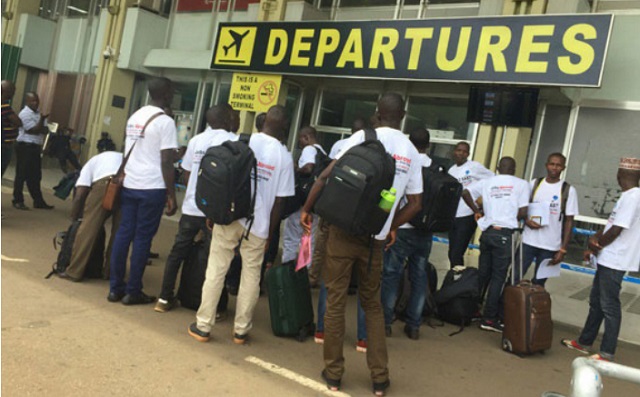
Why government faces dilemma in fighting human trafficking
Kampala, Uganda | IAN KATUSIIME | When Bernadette Akampurira went to Jordan, an Arab country in the Middle East region, in search of the proverbial green pastures in March last year, she was hopeful. She was one of the thousands of Ugandans flocking to the region to work as housemaids, security guards and other jobs as domestic workers.
But on Jan. 30 at 4pm, Akampurira’s body was returned in a casket through Entebbe International Airport. She was just 22. It was the heartbreaking end to a journey that started with hopes and dreams. A post mortem report done at Mulago Hospital indicated that Akampurira died of severe anemia.
She had communicated to her mother about an illness the week before she passed on. She had requested the company she worked for in Jordan to help her with transport back home before she died.
Although it is hard to tell the exact nature of circumstances that led to Akampurira’s death, she joins a grim statistic of Ugandans who have died in the Middle East or suffer untold indignities in their course of duty.
As Ugandans have been enslaved and others subjected to gross sexual abuse after being trafficked, there has been debate in the public on the measures the Ugandan government is putting in place to stem the vice. There is Ministry of Gender, Labour and Social Development, Police, State House Anti-Corruption Unit, UPDF who have all been involved in the efforts to stop the atrocity.
The State House Anti-Corruption Unit under Nakalema is so far leading the efforts against human trafficking. On Jan. 31, working with Police officers, the Unit intercepted four girls at Entebbe International Airport who were allegedly being trafficked. The unit detained two suspects Resty Nakibende and Muloni Aramanzani whom it was set to produce in court.
The unit is also investigating the death of four Ugandans who died in Kuwait in September 2019. Sarah Achieng, John Torres Mujuzi, Moses Kiwanuka, and Charles Bekalaze were named as the victims after their bodies were received at the airport.
But The Independent has learnt from several sources that in spite of the widely reported cases in the media of Ugandans who are killed in Arab nations like Saudi Arabia Yemen, Oman, Kuwait; a lot more Ugandans are willing to travel for work because of another number of Ugandans who come back from these nations with success stories. This is after say, acquiring money to build a house, paying school fees. This exodus to Arab nations has happened due to the increasing scarcity of jobs in Uganda.
During a national consultative policy workshop for the Office of the Director of Public Prosecutions (ODPP) held on Jan. 22 at Imperial Royale Hotel, The Independent asked outgoing DPP Mike Chibita about what the office was doing to curb the problem in light of a growing body of evidence against labour export companies which have been cited as complicit in the inhumane treatment of Ugandans who go to work abroad.
“You are approaching it from the wrong perspective. These Ugandans sign contracts with these companies. We cannot come in when there is a valid contract between these two entities,” Chibita answered.
The companies based here are part of the supply chain to entities in need of domestic workers in the Middle East.
Ugandans resist
Chibita added that agencies like the State House Anti-Corruption Unit led by Lt. Col. Edith Nakalema, have taken some action. “They raided a bungalow where 98 girls were being kept. The girls refused to say anything in their statements with the police.”
Chibita added that the company behind the girl’s plans to travel to an Arab country sued the Attorney General demanding Shs1 billion in damages.
A source in the office of the DPP narrated another case where an operation to export Ugandan girls to the Middle East was busted in Kenya by authorities there. “When the girls were brought here (in Uganda) they refused to budge after questioning from Ugandan police officers,” he said. “They asked ‘Are you going to feed us now?” Are you going to pay us a salary?”
Sources familiar with workings of labour export companies talk of a sheltering centre in Jinja district where girls who intend to work in Arab nations are trained on how to conduct themselves, they undergo two medical check-ups and are kept in house for a period of two weeks. It is akin to boot camp. The two week ‘detention’ is meant to avoid any eventualities like contraction of diseases or last minute pulling out when the company has already incurred expenses on those headed for work.
 The Independent Uganda: You get the Truth we Pay the Price
The Independent Uganda: You get the Truth we Pay the Price





happy i was informed